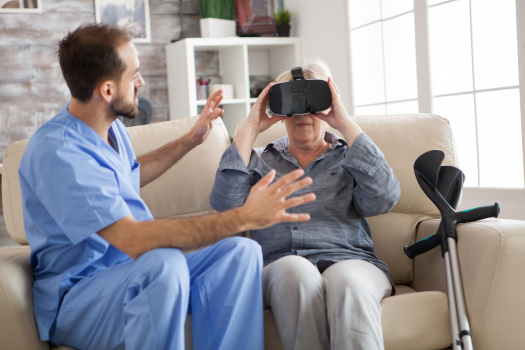
Virtual reality technology is emerging as a promising therapeutic tool for dementia patients, offering new ways to stimulate memory, reduce anxiety, and enhance quality of life. Healthcare providers and families are increasingly exploring how immersive experiences can provide comfort and cognitive benefits for those living with dementia.
How Virtual Reality Benefits Dementia Patients
Virtual reality creates immersive environments that can transport dementia patients to familiar places or calming settings. These experiences can trigger positive memories and emotions, providing several therapeutic benefits:
- Memory stimulation through familiar environments like childhood homes or neighborhoods
- Reduced agitation and anxiety by creating calming, peaceful virtual spaces
- Enhanced social interaction when shared with family members or caregivers
- Better mood and engagement through interactive and meaningful experiences
- Safe exploration of places that may no longer be physically accessible
The technology allows dementia patients to revisit meaningful locations without the stress or confusion of actual travel, making it particularly valuable for those with mobility limitations or advanced dementia.
Aging adults who need help managing mental and physical health issues can benefit from the assistance of highly trained professional caregivers. If your senior loved one has been diagnosed with a serious condition and needs help with tasks like meal prep, transportation, bathing, and grooming, reach out to Tucson Home Care Assistance, a leading provider of respite care families can trust. We also offer comprehensive care for seniors with dementia, Alzheimer’s, and Parkinson’s.
Types of Virtual Reality Experiences
Different VR applications serve various therapeutic purposes for dementia patients. Nature-based experiences featuring beaches, forests, or gardens can promote relaxation and reduce stress. Historical environments allow dementia patients to explore familiar time periods that may trigger positive memories.
Travel experiences enable virtual visits to famous landmarks or culturally significant locations. Some programs focus on familiar domestic settings, recreating kitchens or living rooms from past decades to stimulate memory recall. Interactive experiences, such as virtual pet therapy or simple games, can provide cognitive stimulation while maintaining engagement.
A professional caregiver can be a wonderful game-playing companion for your loved one. Seniors can face a variety of challenges as they age, many of which can be mitigated with the help of professional in-home caregivers in Tucson who provide high-quality senior home care. Tucson families trust Home Care Assistance to help their elderly loved ones age in place safely and comfortably.
Implementation Challenges and Considerations
While promising, VR therapy for dementia patients requires careful consideration of several factors. The technology must be simple enough for those with cognitive impairments to use comfortably. Motion sickness or disorientation can occur, particularly in individuals with balance issues or spatial confusion.
Supervision by trained caregivers or healthcare professionals is essential to ensure safety and maximize therapeutic benefits. The content must be carefully selected based on individual preferences, cultural background, and stage of dementia. Cost considerations also play a role, as specialized VR equipment and software require significant investment from healthcare facilities or families.
Current Research and Evidence
Recent studies have shown encouraging results for VR therapy in dementia care. Research indicates that dementia patients often experience reduced anxiety levels and better moods following VR sessions. Some studies have documented increased social engagement and communication during and after virtual reality experiences.
Healthcare facilities using VR therapy report that dementia patients often show greater participation in other activities following VR sessions. While more long-term research is needed, preliminary evidence suggests regular VR therapy may slow certain aspects of cognitive decline and boost overall quality of life for dementia patients.
Future Directions in VR Dementia Care
The field continues to evolve with advancing technology and growing understanding of dementia care needs. Developers are creating more personalized VR experiences tailored to individual histories and preferences. Artificial intelligence integration may soon allow VR systems to adapt in real time based on responses and engagement levels.
Healthcare providers are exploring group VR therapy sessions to enhance social interaction among dementia patients. Training programs for caregivers and healthcare staff are expanding to ensure proper implementation of VR therapy protocols. As costs decrease and technology becomes more accessible, VR therapy is likely to become a standard component of comprehensive dementia care programs.
Technology such as VR can enhance quality of life for older adults with dementia, and so can having a trained caregiver close by. Aging in place can present a few challenges for seniors living with dementia. However, they can still live independently at home with the help of professional dementia care. Tucson families can rely on Home Care Assistance to provide their elderly loved ones with mental and social stimulation, timely medication reminders, assistance with meal prep, and much more. Our caregivers are available around the clock to help your loved one live a happier and healthier life. Call Home Care Assistance today at (520) 276-6555 to learn about our high-quality in-home care services.